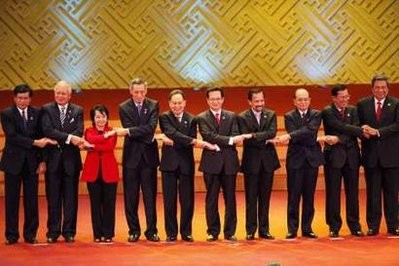Southeast Asian leaders said Friday their governments should prepare to phase out economic stimulus measures introduced during the global financial crisis as their economies recover.

The Association of Southeast Asian Nations (ASEAN) leaders said at the end of an annual summit in the Vietnamese capital Hanoi that they were confident the support measures could be wound down without damaging economic recovery.
"We affirm the need to start working on mechanisms to reverse the fiscal and monetary stimulus and then phase out these policy accommodations," the leaders said in a joint statement.
They said they are "fully confident that at the appropriate time we will be able to do so effectively to ensure sustained recovery and development".
ASEAN's export-dependent economies were battered by the financial crisis that began in the United States in late 2008 and lasted well into last year.
Like the rest of Asia, ASEAN governments rolled out massive economic stimulus packages and policies to boost domestic spending and eased credit lines to help the region emerge from the crisis.
But the measures, in large part spending packages to boost domestic consumption in order to take the slack from falling exports, have strained government budgets.
The leaders said that as market conditions improve and regional economies begin to recover, governments must reconsider the support mechanisms and let the private sector lead the growth.
"We will maintain monetary and fiscal support while preparing for an orderly unwinding of expansionary policies until the recovery is on a firm footing," they said.
"We note that as market conditions and the economic outlook are improving, we need to reconsider the continued support of monetary and fiscal policies for sustained recovery and resumption of private credit flows in our economies."
International Monetary Fund (IMF) deputy managing director Naoyuki Shinohara said Thursday on the sidelines of ministerial talks also in Vietnam, that ASEAN as a group is expected to grow by 5.5 percent this year.
The forecast is better than the global average growth of 4.0 percent and sharply higher than the bloc's sluggish 1.3 percent expansion last year due to the global downturn.
ASEAN groups Brunei, Cambodia, Indonesia, Laos, Malaysia, Myanmar, the Philippines, Singapore, Thailand and Vietnam, a combined market of nearly 600 million people.
Economists have cautioned against hasty and disorderly exits from the stimulus packages.
World Bank chief economist for the East Asia and Pacific region Vikram Nehru said Wednesday the government fiscal stimulus measures should be allowed to run to the end of this year to see how effectively the private sector will take over as the major growth engine.
The leaders also pledged to continue cooperation to restore the "health of financial systems" and to boost monitoring procedures to spot any future problems at an early stage.
Regionally, Australia and India have raised interest rates to check inflation, and ASEAN member Malaysia last month hiked its key rate for the first time in almost four years after the economy emerged from recession.
Other ASEAN central banks, including the group's biggest member Indonesia, have kept interest rates steady.
While political developments in countries like Thailand could delay rate increases, "the bigger picture remains one where Asian economic growth is surprising on the upside and central banks have to hike rates sooner rather than later," Singapore's DBS Bank said.







)
















